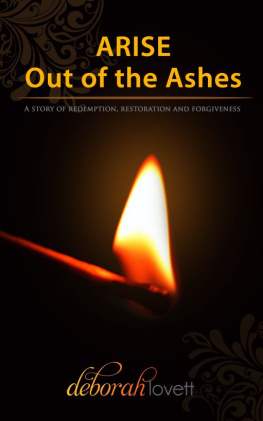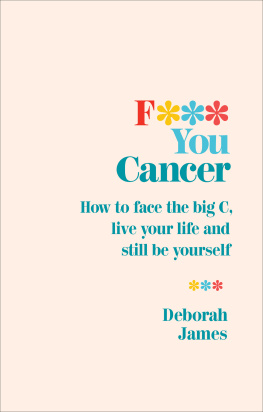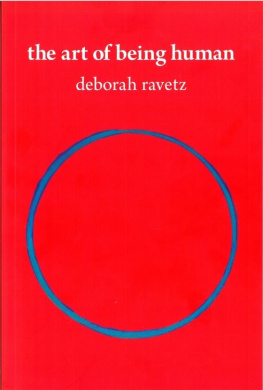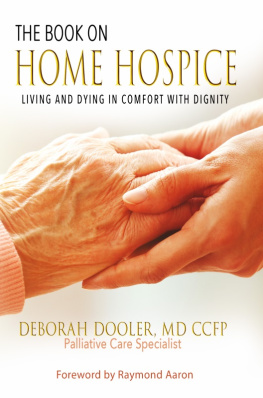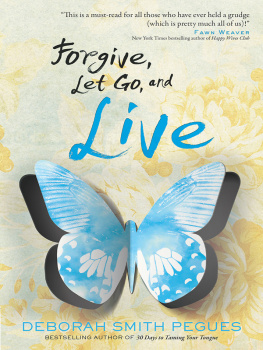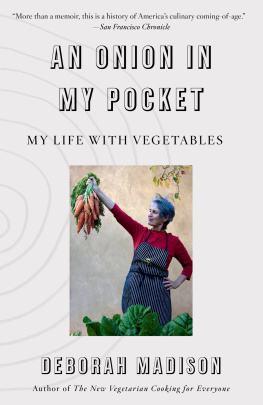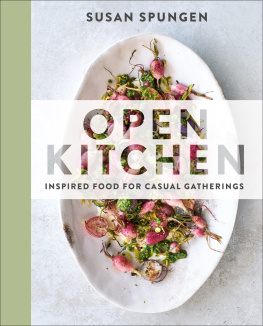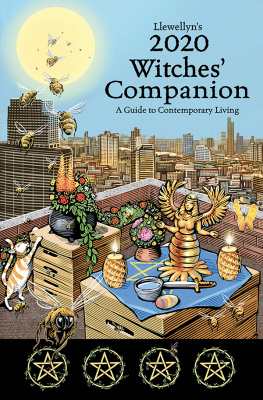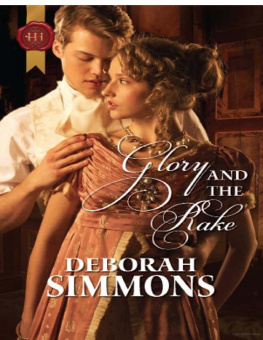Deborah Spungen - And I Don’t Want to Live This Life
Here you can read online Deborah Spungen - And I Don’t Want to Live This Life full text of the book (entire story) in english for free. Download pdf and epub, get meaning, cover and reviews about this ebook. year: 0, genre: Art. Description of the work, (preface) as well as reviews are available. Best literature library LitArk.com created for fans of good reading and offers a wide selection of genres:
Romance novel
Science fiction
Adventure
Detective
Science
History
Home and family
Prose
Art
Politics
Computer
Non-fiction
Religion
Business
Children
Humor
Choose a favorite category and find really read worthwhile books. Enjoy immersion in the world of imagination, feel the emotions of the characters or learn something new for yourself, make an fascinating discovery.

- Book:And I Don’t Want to Live This Life
- Author:
- Genre:
- Year:0
- Rating:3 / 5
- Favourites:Add to favourites
- Your mark:
- 60
- 1
- 2
- 3
- 4
- 5
And I Don’t Want to Live This Life: summary, description and annotation
We offer to read an annotation, description, summary or preface (depends on what the author of the book "And I Don’t Want to Live This Life" wrote himself). If you haven't found the necessary information about the book — write in the comments, we will try to find it.
And I Don’t Want to Live This Life — read online for free the complete book (whole text) full work
Below is the text of the book, divided by pages. System saving the place of the last page read, allows you to conveniently read the book "And I Don’t Want to Live This Life" online for free, without having to search again every time where you left off. Put a bookmark, and you can go to the page where you finished reading at any time.
Font size:
Interval:
Bookmark:
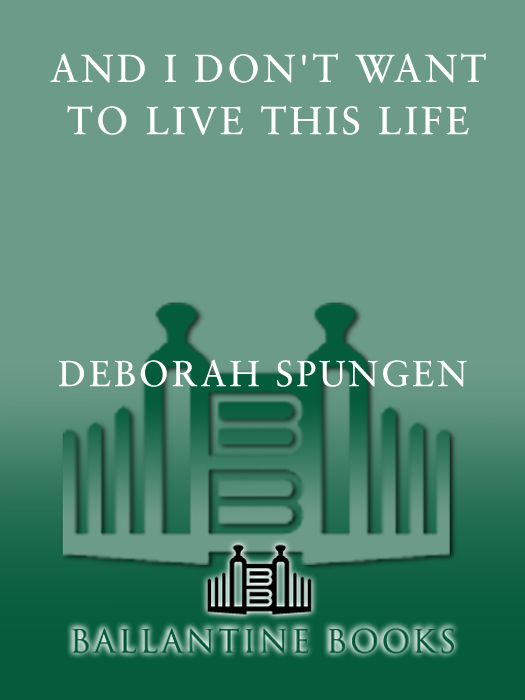
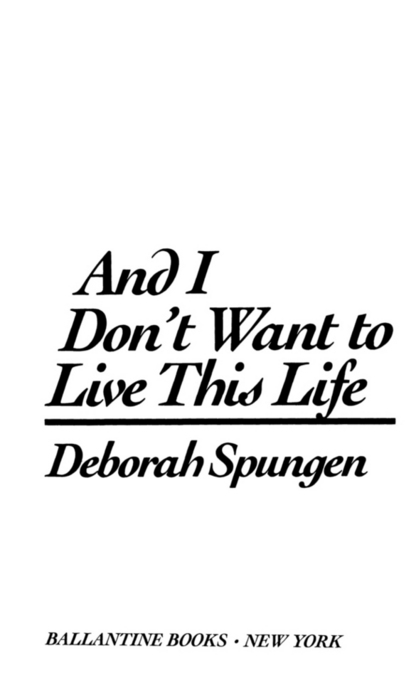
Copyright 1983 by Deborah Spungen
Introduction copyright 1994 by Deborah Spungen
All rights reserved under International and Pan-American Copyright Conventions. Published in the United States by Ballantine Books, a division of Random House, Inc., New York, and simultaneously in Canada by Random House of Canada Limited, Toronto.
Grateful acknowledgment is made to the following for permission to reprint previously published material:
Liveright Publishing Corp.: A Poets Advice to Students by e. e. cummings. Reprinted from A MISCELLANY, REVISED, edited by George James Firmage with permission of Liveright Publishing Corp. Copyright 1955 by e. e. cummings. Copyright 1965 by Marion Morehouse Cummings.
Copyright 1965 by George James Firmage.
Some of the names of the people and places have been changed throughout the book.
www.randomhouse.com/BB/
Library of Congress Catalog Card Number: 96-96704
eISBN: 978-0-307-80743-4
This edition published by arrangement with Villard Books, a division of Random House, Inc. Villard Books is a registered trademark of Random House, Inc.
v3.1
Authors Note
I am especially grateful to writer David Handler for the many difficult months he spent guiding me toward what it all meant and showing me how to say it.
Murder: The American Heritage Dictionary of the English Language defines it as the unlawful killing of one human being by another, especially with malice aforethought. The mother of a murdered child has a different definition: The blackest hell accompanied by a pain so intense that even breathing becomes an unendurable labor. I know; I am the mother of a murdered child.
Our oldest daughter, Nancy, was murdered on Thursday, October 12, 1978. She was twenty years old. I was at work when I received the phone call from the New York City police that changed my life and that of my family forever. Im sorry to tell you that your daughter is dead. I had been expecting that phone call and those words for years. Nancy has been emotionally disturbed since a neurologically traumatic birth. There was no cure for her pain and suffering, nor for ours. She self-medicated with heroin and other drugs, and by the time she was a teenager, I began to anticipate and fear the inevitable overdose, suicide. These were words that I could understand. I heard the detective continue, Mrs. Spungen, you daughters boyfriend, Sid Vicious, has been arrested for her murder. Murder!!! That was a word I could not comprehend. It only happened to other people on the six oclock news.
The first few days after the death of a loved one are usually filled with a numbing sadness as the family goes through the ritual of saying good-bye, as they begin to mourn. This is not the way it is for the family of a murder victim. We had to contend with so much that we were not prepared for: identifying the body, involvement with the criminal justice system, dealing with the media. As we stumbled through this maze, we discovered that we, too, had become victims. I kept wondering if another mother had ever experienced and survived this horrible ordeal. Where is another mother? I asked over and over again, but no one answered.
As I gradually moved back into the outside world, away from our protective circle, I encountered many unexpected feelings and reactions at every turn. I was astounded to discover that there is a stigma attached to homicide. There is a strong analogy to the rape victims experience, though for the family of a homicide victim, the blame and the resulting implications extend beyond the victim to include them as well. I remember that on several occasions someone, when my back was turned, pointed me out and said in a loud voice, Thats the one whose daughter was murdered! It was as if Nancys murder had not only made me deaf and blind, but also at fault.
My life slowly began to fall into a more normal rhythm again, albeit a different one. I no longer felt as consumed by Nancys death, but in place of the obsessive thoughts, I felt a curious mixture of frustration, anger, and pain. My former levels of energy and drive were slowly being restored, but I had nowhere to direct them. What I found interesting and meaningful before Nancys death often seemed empty and insipid now.
Eighteen months after Nancys murder, I made contact with Charlotte Hullinger, the founder of the Cincinnati-based support group, Parents of Murdered Children (POMC). There was no chapter in Philadelphia, and I wasnt prepared to get involved. One day, after five months of long-distance conversations, Charlotte called to tell me that no one else had come forward to start a chapter and asked me, once more, if I would be willing to do so.
I heard myself answer, without hesitation, Yes, I can do it. I saw the image of those words in front of me, as if they were encapsulated in a cartoon balloon, and once uttered, I couldnt take them back.
On the second anniversary of Nancys murder, October 12, 1980, my husband, Frank, and I sat in our living room with seven other families at the first meeting of the support group. For the first time since Nancys death, we felt comfortable talking with others about what had happened to Nancy and to our family; we had finally found a safe place.
Ed Rendell, the present mayor of Philadelphia and then the district attorney in Philadelphia, attended the third meeting of the support group, in January 1981, to talk to us about the criminal justice system and how it impacts on families of murder victims. Ed sat in our living room on a bitter, cold, gray Sunday afternoon and said, as he looked at the thirty families seated in the large circle, Its your task to represent your loved ones in the aftermath of the murder; it is the family that stands in for the homicide victim throughout the criminal justice process. Its the last thing that you can do for your loved one; its a way of saying good-bye.
As Ed continued to talk to this gathering of people, who had nothing more in common than the fact that their loved ones had been murdered, he said, Its important to be here to share your pain and your tears and your laughter, but its not enough. You need to do more, you need to get involved with the criminal justice system, you need to go to court with families and make a presence in the courtroom. Frank has teased me since that day; he assures me that when Ed said you, he meant the generic you and not necessarily me. But I thought that he meant me. With his words Ed gave me my bearings and set me on a positive course in a new direction. In so doing he gave me the ability to restore a sense of control over my life, something that I thought was irretrievably lost when Nancy was murdered.
As the support group continued to meet each month, I began to see my fellow parents, not just as friends, but as family. It was this new family that gave me the strength and courage to speak out and share my experience, not just of Nancys life, but also of her death. I now felt prepared to carry out a promise that I had made to myself when Nancy was seventeen years old.
During Nancys lifetime, whenever I experienced a particularly difficult and trying episode with her, I had the habit of replaying the events of the day in my mind, as if somehow I might be able to undo the frustration and the turmoil. The images would unfold in a linear way, like chapters in a book. One day, as I was going through this futile exercise, I realized with a sudden insight that Nancys life read like a book, only it was real, not fiction. It was at that very moment that I made the decision that someday I would write about her life. I felt that only by writing about her life could I discover its meaning and value. If I could share that with others, then in some small way I might be able to help others by letting them know they were not alone. I realized that the book would have to be put off to some future time and that I would know when it was the right time. And I knew, in my heart, that day would come sooner than I wanted or anticipated.
Font size:
Interval:
Bookmark:
Similar books «And I Don’t Want to Live This Life»
Look at similar books to And I Don’t Want to Live This Life. We have selected literature similar in name and meaning in the hope of providing readers with more options to find new, interesting, not yet read works.
Discussion, reviews of the book And I Don’t Want to Live This Life and just readers' own opinions. Leave your comments, write what you think about the work, its meaning or the main characters. Specify what exactly you liked and what you didn't like, and why you think so.

